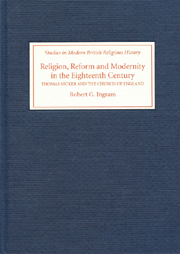Book contents
- Frontmatter
- Contents
- Dedication
- Preface
- Abbreviations
- 1 ‘Efforts at Amendment’
- 2 Becoming an Anglican
- 3 Becoming an Insider
- 4 The Church and the Enlightenment
- 5 The Church and the Parishioners
- 6 The Church and the State
- 7 The Church and America
- 8 The Church and Churches Abroad
- Epilogue
- Bibliography
- Index
- Previously published volumes in this series
8 - The Church and Churches Abroad
Published online by Cambridge University Press: 12 September 2012
- Frontmatter
- Contents
- Dedication
- Preface
- Abbreviations
- 1 ‘Efforts at Amendment’
- 2 Becoming an Anglican
- 3 Becoming an Insider
- 4 The Church and the Enlightenment
- 5 The Church and the Parishioners
- 6 The Church and the State
- 7 The Church and America
- 8 The Church and Churches Abroad
- Epilogue
- Bibliography
- Index
- Previously published volumes in this series
Summary
On 6 October 1745, Secker addressed his parishioners at St James's, Westminster, on the dangers of popery, arbitrary government, and universal monarchy. Wars provoked crises of national and religious identity during the eighteenth century, and they tended to give occasion for clerics to declaim the popish menace. In substance, Secker's sermon hardly distinguished itself from the many others which flew off the presses in 1745–46. The Church of England was ‘the most rational and worthy of God, the most humane and beneficial to men, the furtherest from being either tyrannical or burdensome, the freest from superstition, enthusiasm, and gloominess, of any in the world’. It had been ‘established with such care, that the support of it is inseparable from that of the civil government’. Yet, he noted, those who dissented from it were wholly free to do so. All of this, of course, contrasted markedly with the Church of Rome. ‘No one instance can be given, that Popery ever spared Protestantism for any continuance, after it was able safely to oppress it,’ Secker gravely warned his audience. This was not warrantless fear-mongering, he reckoned, since James II had not so long ago trampled on the rights of English men and women in the cause of popery.
- Type
- Chapter
- Information
- Religion, Reform and Modernity in the Eighteenth CenturyThomas Secker and the Church of England, pp. 260 - 282Publisher: Boydell & BrewerPrint publication year: 2007



